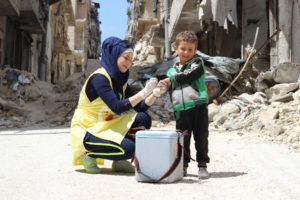
World Polio Day 2022
Access to vaccination imperative for every child
After decades of progress bringing polio to the brink of eradication, the recent surge of polio outbreaks is of serious concern. In 2022, no child should be at risk of paralysis or even death, from diseases that we can prevent with a vaccine. Recent outbreaks of polio are an urgent reminder of the need to increase access to all routine immunisation services and vaccination campaigns amidst unprecedented backsliding.
Last week on October 18th donors convened at the World Health Summit in Berlin to make financial commitments to the Global Polio Eradication Initiative (GPEI), raising a total of USD$2.6 billion to support the GPEI’s work to eradicate polio and strengthen health systems by 2026. However, this year’s World Health Summit comes at a time when cases of polio worldwide are rising at a deeply concerning rate, with cases of wild polio in Africa for the first time since 2016.
In 2022, no child should suffer from diseases that we can prevent
Since its inception in 1988, the GPEI, through its partners including UNICEF, has reduced the number of polio cases around the world by 99.9%, allowing 20 million children to walk who would have otherwise been paralysed by the disease. These achievements have been made possible by the tireless efforts of a dedicated workforce of over 20 million volunteers and political will and financial support from international donors, including the UK Government.
Polio is entirely preventable through access to vaccination. However, decreases in immunisation coverage for polio and other essential childhood vaccines has led to a resurgence in cases of polio and other vaccine preventable diseases. These outbreaks come against a backdrop of the largest sustained backslide in immunisation in almost 30 years, resulting in 18 million children not receiving any vaccines at all in 2021.
Despite the African continent having been declared free from Wild Polio in 2020, cases of Wild Polio have emerged this year in Malawi and Mozambique. Failure to eradicate polio could lead to 200,000 new cases each year within the next decade. The re-emergence of polio in countries that have not seen cases of wild polio for years is therefore of serious concern.
The detection of the polio virus in sewage samples in London and the state of emergency declared in New York, following the emergence of a polio case, is a stark reminder that no child anywhere is safe, until all children everywhere are protected through vaccination.
An investment in systems strengthening and public health
The ability to respond to future pandemics effectively and safeguard child rights, lies in the ability to strengthen and protect country’s Primary Health Care (PHC) systems, in which polio workforce and infrastructure have played a pivotal role – far beyond polio eradication efforts. The unique value-add of polio resources was perhaps never more apparent than during the response to COVID-19, during which polio staff played an integral role in low- and lower-middle income countries. For example, in South East Asia over 2,600 polio and immunisation personnel harnessed their experiences of managing immunisation programmes in emergency settings to play a leading role in the COVID-19 response. Beyond emergency responses, the GPEI plays a critical role in disease surveillance, logistics for routine immunisation, and even vitamin A supplementation to help prevent malnutrition. These critical and life-saving interventions demonstrate the enormous value-add and potential of the polio workforce beyond polio eradication efforts.

A health worker vaccinates a child in Hulluk neighbourhood in Aleppo city as part of the nationwide immunization campaign.
Health workforce – strengthening systems for every child
Community health workers and volunteers have made the remarkable progress on the fight against polio possible. On World Polio Day we pay tribute to the tireless efforts of over 20 million community health volunteers and recognise their contribution to the prevention of over 20 million cases of paralysis and a 99.9% reduction in cases since 1988.
However, the WHO warns that by 2030 we could face a shortage of over 15 million health workers. Community health care workers (CHWs) play a pivotal role in delivering essential services to communities living in remote and hardest to reach locations. The vast majority of CHWs, 70% of whom are women, remain unpaid and under supported for their critical work. Efforts to restore, sustain and increase the uptake of essential child health services and to increase preparedness for future pandemics must prioritise the recruitment and retention of CHWs and ensure the CHWs are supported with protection, training and remuneration for their demanding and vital roles. Adequate support and formal integration of CHWs within national health systems will be critical for protecting children against vaccine preventable and life-threatening diseases.
UK Legacy – the need for further action
The UK Government has played a pivotal role in the fight to eradicate polio and increased access to vaccination for a range of vaccine preventable diseases. Alongside financial support, political leadership on addressing backsliding on childhood immunisation and strengthening health systems is more imperative now than ever before, amidst competing challenges of COVID-19, conflict and climate change.
To overcome recent challenges, the UK Committee for UNICEF (UNICEF UK) urges the UK Government to show political leadership on restoring routine immunisation and vaccination campaigns, protect financial commitments to global health, and work with partners and countries around the world strengthen PHC and immunisation systems.
By Neil Raw – Senior Policy Adviser – Child Health

